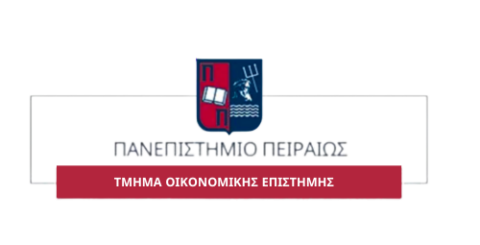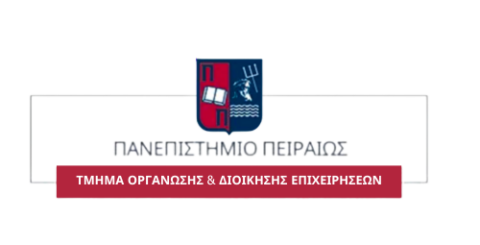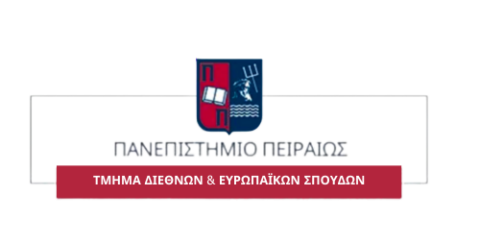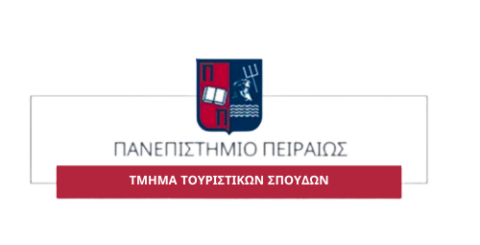School of Economics, Business and International Studies
27 January 2024 2024-01-27 19:35School of Economics, Business and International Studies
- Welcome note
- Administration
- Administrative Acts
- Study Programs
- Registries of electors
- Research Laboratories

A few words from the Dean

I welcome you to the official website of the School of Economics, Business and International Studies (SEBIS) of the University of Piraeus.
Welcome note
It is with great pleasure, but also with a great sense of responsibility, that I welcome you to the School of Economics, Business and International Studies of the University of Piraeus. It is truly important and an honour for me to undertake the Deanship of the School at this particular time, as the world is experiencing perhaps one of the most dramatic socio-economic and political changes in modern history.
In today’s global business landscape, restructuring is the new assumption. Every technological change brings implications that spread into the workplace. To succeed in this ever-evolving reality, the world needs leaders who are flexible, adaptable and ready to face an uncertain future. In the School of Economics, Business & International Studies, we have adopted this challenge in the way we teach, share knowledge and also undertake research. Our core purpose remains clear: we seek to provide innovative education, prepare the next generation of leaders and foster a strong research culture that responds to the needs of academia, business, the economy and society.
With a history of almost nine decades, the University of Piraeus has set the high standard for executive education in Greece since its foundation. The School’s commitment to quality, its promise of impact and its ever-present sense of responsibility for creating future leaders and change agents of tomorrow, are the foundations for its further development.
Building on very good foundations, I am confident that our School will continue to grow, progress, flourish, provide the best possible business, economics, international and tourism education to students, produce pervasive and effective research to advance knowledge, improve public policies by engaging in informative policy research and debates, co-develop with the business and international community, educate and raise up current and future leaders, address the needs of the business community and the world, and develop the skills and knowledge of our students.
As a city distinguished for its entrepreneurial spirit, its diverse cultural mix and its unique dynamic energy, Piraeus consistently attracts “the best of the best” – as evidenced by the members who make up our School. We are proud -and fortunate- to have professors who excel in both research and teaching internationally. The School has an important and remarkable human resource, with knowledge and international experience, which can contribute to research and education and make a decisive contribution to the quality and visibility of the School.
The School’s broad portfolio of undergraduate and postgraduate programs is in particularly high demand. They are competitive and attract high quality students from a wide range of backgrounds. Students -undergraduate and postgraduate- are active, confident and distinguished for their judgement. They are encouraged to explore the full range of the School’s services, ranging from our attractive undergraduate degree programs and our internationally renowned postgraduate courses, to our executive education programs.
At our School there are countless opportunities to develop your economic, business, international and tourism analytical and communication skills. The dedication of excellent teachers will make learning an exciting experience. Students in the Departments combined with the School’s established history can look forward to excellent career opportunities when they graduate.
The University of Piraeus aspires to be a Global University in the next decade, with an innovative, international, interdisciplinary orientation. Our ambitions in the School of Economics, Business & International Studies are equally challenging: to become a leading School in Europe with significant local, regional and global influence. Internationalisation is a key strategy of the School for cultural diversity, diversity, inclusion, innovation and social sensitivity.
I invite you to join forces to make the School a guiding light in academia by making the world a better place.
Professor Nikolaos Georgopoulos
Dean of the School of Economics, Business & International Studies
The School
The School of Economics, Business, and International Studies is the largest in the University of Piraeus, with 4 of its 10 academic departments, 26 laboratories, more than 75 faculty members, and 15 postgraduate programs (Master’s degrees), two of which are taught in English.
The following 4 departments currently operate within the School:- Department of Economics
- Department of Business Administration
- Department of International and European Studies
- Department of Tourism Studies
The School was officially established in 2013, but its history dates back to 1938 when the School of Industrial Studies was founded. From this, the two oldest departments emerged: the Department of Economics and the Department of Business Administration. The Department of International and European Studies was established in 2000, and the Department of Tourism Studies in 2017.
The SEBIS' Team
The departments are staffed by distinguished scientists of international repute with extensive academic, research, and professional experience. Both the faculty members and the members of the Educational and Research Staff, Special Technical Laboratory Staff, and external doctoral lecturers form the large ‘family’ of the School, actively participating in its activities. This circle also includes undergraduate and postgraduate students, doctoral candidates, and postdoctoral researchers. The School relies on experienced and responsible administrative staff that supervises its scientific and administrative actions to inform both teachers and students.
The Faculty
The faculty of the School possess a rich and recognized body of literary and research work. They continuously publish in reputable scientific journals and impart both theoretical knowledge and practical experience to their students, gained from extensive and distinguished collaborations with public and private sector organizations in Greece and abroad. The School combines high-level studies in economics, business, international, and European affairs. It aims to shape scientists with knowledge, perspective, and creativity in whatever professional field they choose to pursue. Through lectures, seminars, workshops, exercises, simulations, international conferences, academic exchanges, and internships in prominent organizations, it strives to build a vibrant and robust academic community that will guarantee excellence for its graduates and future student generations it will host.
The Study Programs
The School of Economics, Business, and International Studies is at the forefront in the specific academic fields covered by its departments, as evidenced by the first-choice declarations of prospective students. The School’s departments have already achieved a high annual graduation rate on a national scale and follow the rapid absorption of graduates into the labor market. In addition, they offer a range of competitive postgraduate programs in both Greek and English that add value to their degrees and promote excellence in knowledge production. The School boasts over 43.000 alumni from its undergraduate, postgraduate, and doctoral programs.
Both the undergraduate and postgraduate programs of the School are structured similarly to those of the world’s best universities with contemporary academic fields, innovative teaching and assessment methods, inter-university collaborations with institutions abroad, and continuous interaction with the Greek and international scientific community. In all programs, there are core courses that provide a basic background and broad overview of the scientific field, as well as elective courses that allow students to design their own individual study program according to their preferences and goals. All additional activities are counted and recorded in detail in Greek and English in the Diploma Supplement to outline the graduate’s profile in their further career path.
Our Core Principles
The core principles of the School’s educational and research programs are interdisciplinarity, extroversion, transparency, international networking, and systematic research. The School already houses an interdepartmental postgraduate program and intends to intensify its efforts in this direction by utilizing the new legal framework for the development of horizontal collaborations between its Departments, as well as with other Departments in Greece and abroad for joint educational and research programs and academic exchanges.
Education is, of course, student-centered, with a primary concern for the comprehensive preparation of students for the continuous expansion of their theoretical and practical knowledge, the use of new technologies, and the ethical approach to scientific problems they will face in the academic and professional arena. The School places significant importance on research presence, administrative functionality, and the social recognition of its members so that the student experience remains unforgettable and the University becomes a point of reference for its graduates. They should consider it their “home” and a springboard for new achievements and initiatives.
I hope that navigating the pages of the School of Economics, Business, and International Studies’ website will provide you with a comprehensive update on the activities and opportunities that open up on this “journey”.
With warm regards,
Professor Nikolaos Georgopoulos
Dean of the School of Economics, Business, and International Studies
Administration

Dean
The Dean of the School of Economics, Business, and International Studies for the academic year 2022-2023 was elected to be Professor Konstantina Botsiou from the Department of International and European Studies.

School's Board
The School's Board consists of:
- The Dean of the School, Professor Konstantina Botsiou,
- The Heads of the Departments:
- International and European Studies, Professor Aristotelis Tziampiris
- Economics, Professor Ioannis Pollalis
- Business Administration, Professor Dimitrios Georgakellos
- Tourism Studies, Professor Aggelos Kotios
- A representative of the students of the school, without voting rights.

School's General Assembly
The General Assembly of the School consists of the faculty and serving lecturers of the School, as well as representatives of the Special Educational Staff, Special Technical Laboratory Staff, and Special Scientific Staff categories.
School Secretariat
Koutsoumpasakou Aikaterini
Office: 110/Main Bld.
Phone: +30 2104142077
E-mail: kkouts@unipi.gr
Roditou Eleni
Office: 532/Main Bld.
Phone: +30 2104142300
E-mail: eroditou@unipi.gr
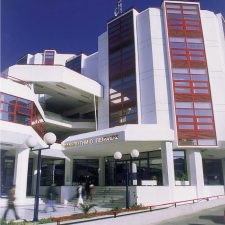
Undergraduate
The School of Economics, Business, and International Studies offers four undergraduate programs. Specifically:
- Undergraduate program in Economic Science (Department of Economic Science)
- Undergraduate program in Business Administration (Department of Business Administration)
- Undergraduate program in International and European Studies (Department of International and European Studies)
- Undergraduate program in Tourism Studies (Department of Tourism Studies)
Postgraduate
The Departments of the School of Economics, Business, and International Studies offer 15 postgraduate programs (Master’s degrees), two of which are in English.
Department of Economic Science
The Department of Economics offers five postgraduate programs:
- M.Sc. in Economic and Business Strategy
- M.Sc. in Health Economics & Management
- M.Sc. in Economics of Education and Management of Educational Units
- M.Sc. in Bioeconomy, Circular Economy and Sustainable Development
- M.Sc. in Applied Public Economics & Policy
The uniqueness of these programs in the Greek context, along with the successful career paths of their graduates since 2006, make them some of the best options for those who wish to excel in the market and possess an inquisitive and creative spirit. If you have high goals and ambitions, we invite you to apply to our programs, which set high academic and practical substantiation standards.
Department of Business Administration
The Department of Business Administration has been offering the following postgraduate programs since the academic year 1995-1996:
- Master in Business Administration (M.B.A.)
- Master in Business Administration – Total Quality Management International (M.B.A.-T.Q.M. International)
- Master in Business Administration – Tourism Management (M.B.A.-Tourism Management)
- Executive Master in Business Administration (Executive M.Β.Α.)
- M.Sc. in Accounting and Control of Public Sector and Businesses
The aim of these postgraduate programs is to prepare administrative executives and consultants at an advanced level, capable of successfully addressing the complex and dynamic international economic environment, contributing to business processes that enhance competitiveness.
In addition to the above programs, in collaboration with the Department of Political Science and International Relations of the University of Peloponnese (leading department) and the Department of Economic Sciences of the Democritus University of Thrace, it organizes and operates the:
Department of International and European Studies
The Department of International and European Studies offers four postgraduate programs:
Interdepartmental Postgraduate Study Programs
The Departments of Business Administration, Economics, and International & European Studies at the University of Piraeus have proceeded to re-establish the interdepartmental postgraduate program:
The purpose of the above program is to create a new generation of distinguished scientists, both in the field of Legal and Economic Sciences, and in the field of modern businesses and organizations. The synergy of combined knowledge and critical ability on critical interdisciplinary issues creates added value, increasing the intellectual capital at a social and professional level.
Registries of Electors
The Dean’s Board of the School of Economics, Business, and International Studies, following recommendations from the Departments’ Assemblies, compiles and updates every two years the Registries of internal and external members for the selection, promotion, and evaluation of the School’s faculty. The Registries are approved by the University Senate and are compiled based on the following criteria:
a) The Registries of internal members include professors or associate professors of the respective School and the Institution. The Registries of external members include professors or associate professors from other domestic higher education institutions and equivalent institutions abroad and researchers of a corresponding level from domestic and foreign research institutes.
b) The professors participating in the Registers of external members must have recognized scientific work.
c) The minimum number of members in the Registries should be sufficient for the appointment of the regular and substitute members of the seven-member committees and the evaluators for each scientific field covered by the School.
d) The Registry of external members from abroad includes members who can understand the candidates’ work and participate in the selection or evaluation processes conducted in the Greek language.
Registries of the School of Economics, Business, and International Studies- Department of Economics (in Greek)
- Department of Business Administration (in Greek)
- Department of International and European Studies (in Greek)
- Department of Tourism Studies (in Greek)
In the School of Economics, Business, and International Studies, 26 active research laboratories have been established and are presented below by department. It is noted that the standard internal operating regulations of the laboratories of the University of Piraeus have been published in the Government Gazette 4859/Issue B/02-08-2023.
Department of Economics
In the Department of Economics, the following research laboratories have been established and are operating:
- Laboratory of Entrepreneurship, Technology, and Economic Strategy (Government Gazette 409/Issue B/24-3-2015)
- Transport Economics and Sustainable Mobility Laboratory (Government Gazette 1194/Issue B/22-6-2015)
- Laboratory of Health Economics and Management (Government Gazette 1194/Issue B/22-6-2015)
- Local and Regional Development Lab (Government Gazette 1696/Issue B/14-8-2015)
- Bioeconomy and Sustainable Growth Laboratory (Government Gazette 1462/Issue B/24-5-2016)
- Financial Markets Economics, Risk Management, and Corporate Governance Laboratory (Government Gazette 1603/Issue B/10-5-2017)
- Strategic Leadership & Digital Transformation Lab (Government Gazette 1428/Issue B/26-4-2018)
Department of Business Administration
In the Department of Business Administration, the following research laboratories have been established and are operating:
- Process and Production Management Laboratory (Government Gazette 409/Issue B/24-03-2015)
- Finance Laboratory (Government Gazette 409/Issue B/24-03-2015)
- Strategy, Economics, E-business, and Entrepreneurship Laboratory (Government Gazette 409/Issue B/24-03-2015)
- Innovative Entrepreneurship and Market Research Laboratory (Government Gazette 409/Issue B/24-03-2015)
- Accounting and Audit Laboratory (Government Gazette 409/Issue B/24-03-2015)
- Management Laboratory (Government Gazette 409/Issue B/24-03-2015)
- Small and Medium-Sized Public Sector Organizations and New Forms of Entrepreneurial Activity Laboratory (Government Gazette 1455/Issue B/24-05-2016)
- Technology Evaluation and Health Data Analysis Laboratory (Government Gazette 4708/Issue B/29-12-2017)
Department of International and European Studies
In the Department of International and European Studies the following research laboratories have been established and are operating:
- Turkish & Eurasian Studies Lab (Government Gazette 410/Issue B/24-03-2015)
- Negotiation & Mediation Center (Government Gazette 410/Issue B/24-03-2015)
- International and European Policy-Program Development (Government Gazette 410/Issue B/24-03-2015)
- International and European Policy (Government Gazette 410/Issue B/24-03-2015)
- Laboratory of Education Policy, Research, Development and Interuniversity Cooperation (Government Gazette 410/Issue B/24-03-2015)
- BRICS Study Laboratory (Government Gazette 410/Issue B/24-03-2015)
- Laboratory of Intelligence and Cyber-Security (Government Gazette 1194/Issue B/22-06-2015)
- Strategic Communication and News Media Laboratory (Government Gazette 1194/Issue B/22-06-2015)
- Laboratory of Eastern Mediterranean, Middle and Major East: Economy – Politics – Civilization (Government Gazette 1179/Issue B/19-06-2015)
- Energy and Environmental Policy Laboratory (Government Gazette 2127/Issue B/11-07-2016)
Department of Tourism Studies
In the Department of Tourism Studies, the following research laboratory has been established and is operating:
- Τourism Excellence Lab – UPΤourism Lab (University of Piraeus Τourism Excellence Lab) (Government Gazette 1904/Issue B/18-4-2022)

